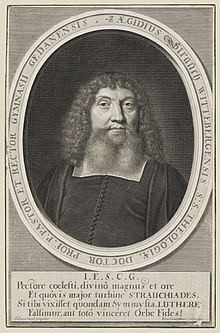Aegidius Shrub II.
Aegidius Strauch (born February 21, 1632 in Wittenberg , † December 13, 1682 in Danzig ) was a Lutheran theologian , historian , mathematician and astronomer .
Life
Aegidius Strauch was born on February 21, 1632 in Wittenberg , the son of Professor of Law and Electoral Councilor Johann Strauch . As early as 1646 he attended lectures at the Wittenberg University and worked in the fields of history, mathematics and oriental languages. In 1649 he moved to the University of Leipzig , where he continued his language studies and devoted himself to studying theology. In 1650 he returned to Wittenberg and on April 29, 1651 acquired the academic degree of a master's degree in philosophy.
Through his frequently disputed private colleges he was appointed adjunct of the philosophical faculty on October 18, 1653 and in 1656 as a substitute for Reinhold Frankenberger 's professor of mathematics. After Frankenberger died, he took over his chair as a full professor in 1664. However, in this position he was only a placeholder for his brother Michael Strauch, who took over this professorship in 1665. Instead, Strauch took over the professorship for history and was subsequently able to devote himself to theological studies. - In 1655 he received permission from the theological faculty to lead public colleges. Strauch received a theological licentiate in 1657 , a doctorate in theology on October 13, 1662, and in 1666 he was appointed assessor in the theological faculty at Wittenberg University. He was involved in the syncretistic dispute with Friedrich Ulrich Calixt .
Although he was massively supported by the Saxon Elector Johann Georg II , he gave up his position at the University of Wittenberg to become pastor of the St. Trinitatis Church and rector of the academic high school in Danzig.
He became a beacon of hope for ordinary citizens. In his book "The Days of Purim" he advocated their participation in important decisions in the city. The patricians in the city council feared the loss of their privileges and removed him from his offices on December 28, 1673 with flimsy justifications. After massive civil unrest, the city council had to reverse its decision on January 4, 1674. When he wanted to go to Hamburg after character assassination and betrayal, his ship was hijacked by soldiers of Elector Friedrich Wilhelm von Brandenburg and he himself was imprisoned in the Küstrin Fortress on false suspicions . Without evidence, he should be “ruthlessly tortured to death as a royal Swedish servant”.
The King of Poland, the King of Sweden, the Elector of Saxony, his relatives and many other supporters campaigned for his release. Only a delegation with citizens from Gdansk achieved the apparently impossible. Strauch was released from unjustified imprisonment on July 9, 1678. Tens of thousands of followers received him in Danzig. All Protestant churches held services for his liberation and let the bells ring. In his honor, several gold and silver coins were minted that his followers wore around their necks. The Danzig council reinstated him on September 8, 1678.
Strauch died on December 13, 1682 in Danzig. After his death, an unprecedented series of defamations began, triggered by Friedrich Wilhelm von Brandenburg. He had the council collect all available corpse documents, but they had long since been distributed among his numerous supporters. So historians rewrote history without further ado. To this day, the picture of Dr. Aegidius Strauch was shaped by these forgeries.
Aegidius Strauch shaped the understanding of history in Europe long after his death with his work Breviarium chronologiae (1657 further editions until 1717), which was also translated into English. As a result of his work, the citizens of Gdańsk were given more say in the city council. The financial support of the Swedish envoy Anders Lilliehöök enabled him to improve the relationship between Poland and Sweden. Strauch married on February 9, 1658 with Martha Magarethe Sibylle Cranach (born September 29, 1634 in Wachsdorf, † June 20, 1705 in Danzig ), who was a daughter of Lucas Cranach III. was.
Works
- De numerorum doctrina aphorismi CCCXLII (1662)
- Tabulae per universam mathesin (1662)
- Consensus repetitus fidei vere Lutheranae (1665)
- Consensus repetitus fidei vere Lutheranae in 88 punctis ... (1668)
- Breviarium chronologiae (1657)
- Continuatio Joannis Sleidani (1668)
- The days of Purim (1672)
- Apostille or starcke and milk food in 176 Sunday and feast day sermons on the Gospels (1683)
swell
- “Amusement idle” by Th. Crusius, Volume III, pages 11–52.
- “From the blessed D. Strauch's fatal incidents” in the “pleasure of idle” by Th. Crusius, volume 4, pages 5-31.
- "Lutheran Church Disputes," by Walch, Volume 1, pp. 339–351.
- "Churches and Heretic Writing" by Arnold, Part 2, Book XVII, c. 7, 19. and c. 11, 11.
literature
- Adolf Schimmelpfennig : Aegidius Strauch . In: Allgemeine Deutsche Biographie (ADB). Volume 36, Duncker & Humblot, Leipzig 1893, pp. 525-527.
- Wolfgang Armin Strauch: Dr. Aegidius Strauch - prisoner of the Elector of Brandenburg . Tredition, Hamburg 2018, ISBN 978-3-7469-3406-8 .
- Heinrich Kühne, Heinz Motel: Famous personalities and their connection to Wittenberg . Verlag Göttinger Tageblatt, Göttingen 1990, ISBN 3-924781-17-6 .
Web links
- Literature by and about Aegidius Strauch II in the catalog of the German National Library
- Works by and about Aegidius Strauch II in the German Digital Library
- Publications by and about Aegidius Strauch II. In VD 17 .
- Astrognosia , 1659 & 1668 - Linda Hall Library (USA)
| personal data | |
|---|---|
| SURNAME | Shrub, Aegidius |
| ALTERNATIVE NAMES | Shrub, Aegidius |
| BRIEF DESCRIPTION | German Lutheran theologian, historian, mathematician and astronomer |
| DATE OF BIRTH | February 21, 1632 |
| PLACE OF BIRTH | Wittenberg |
| DATE OF DEATH | December 13, 1682 |
| Place of death | Danzig |

